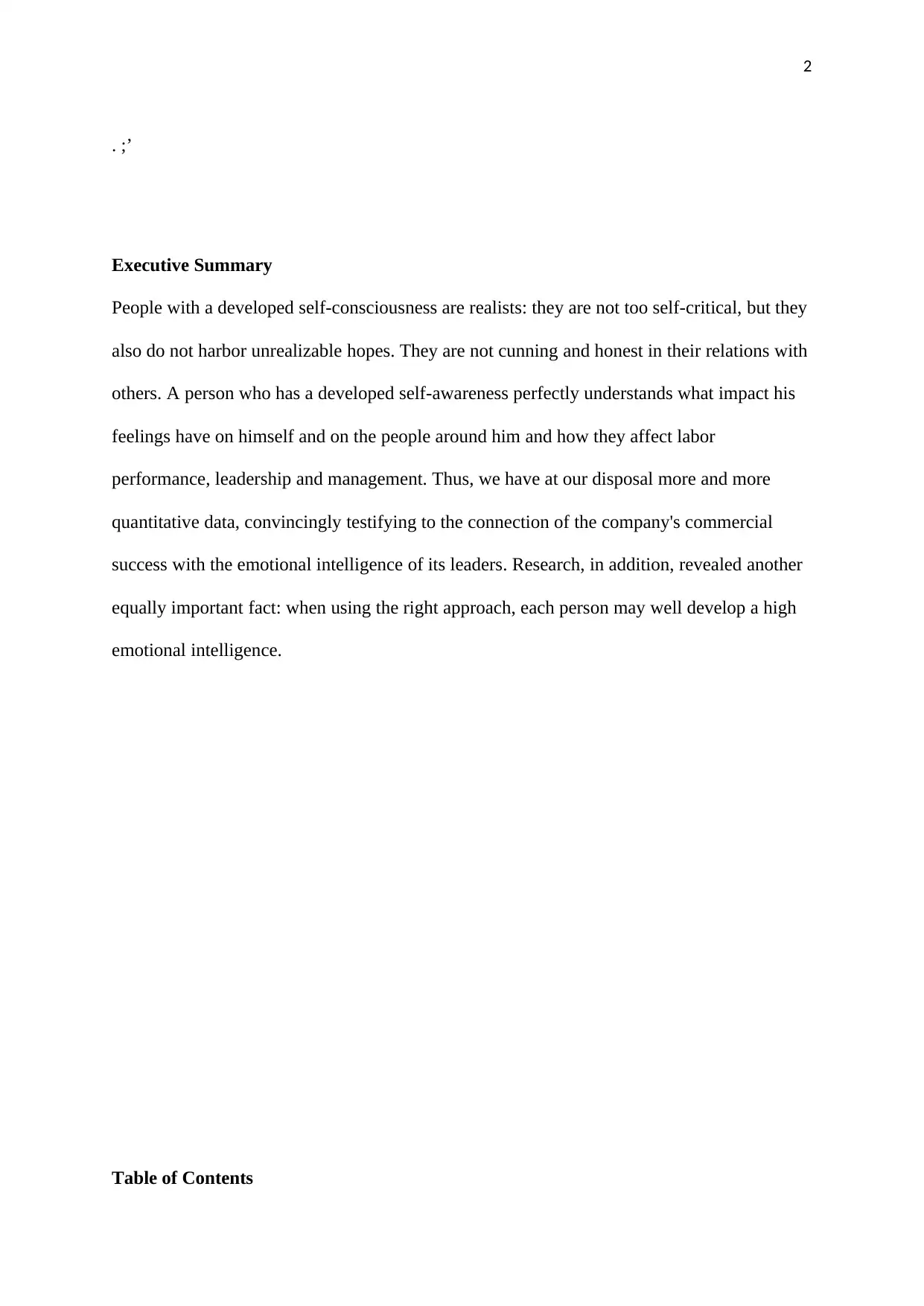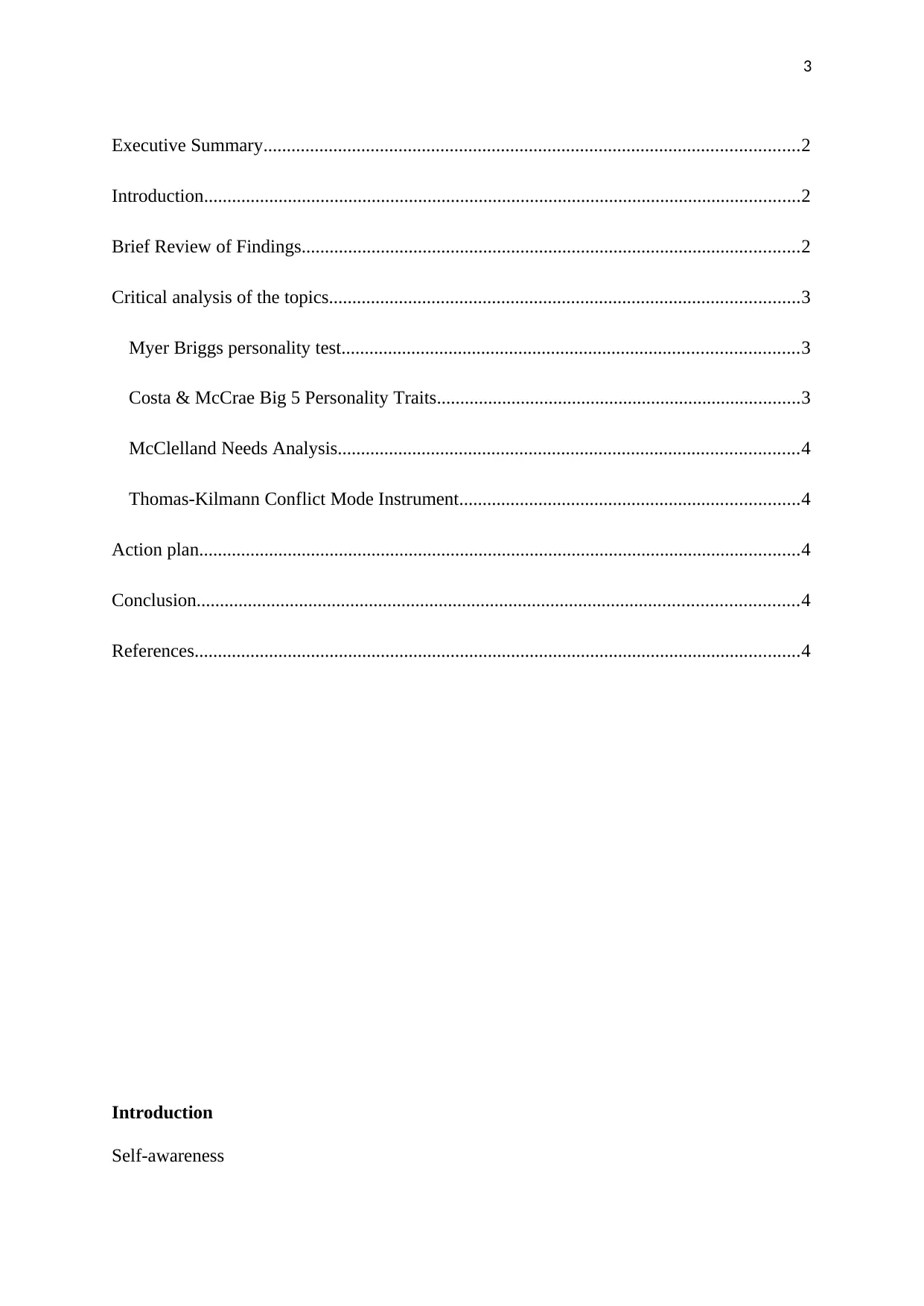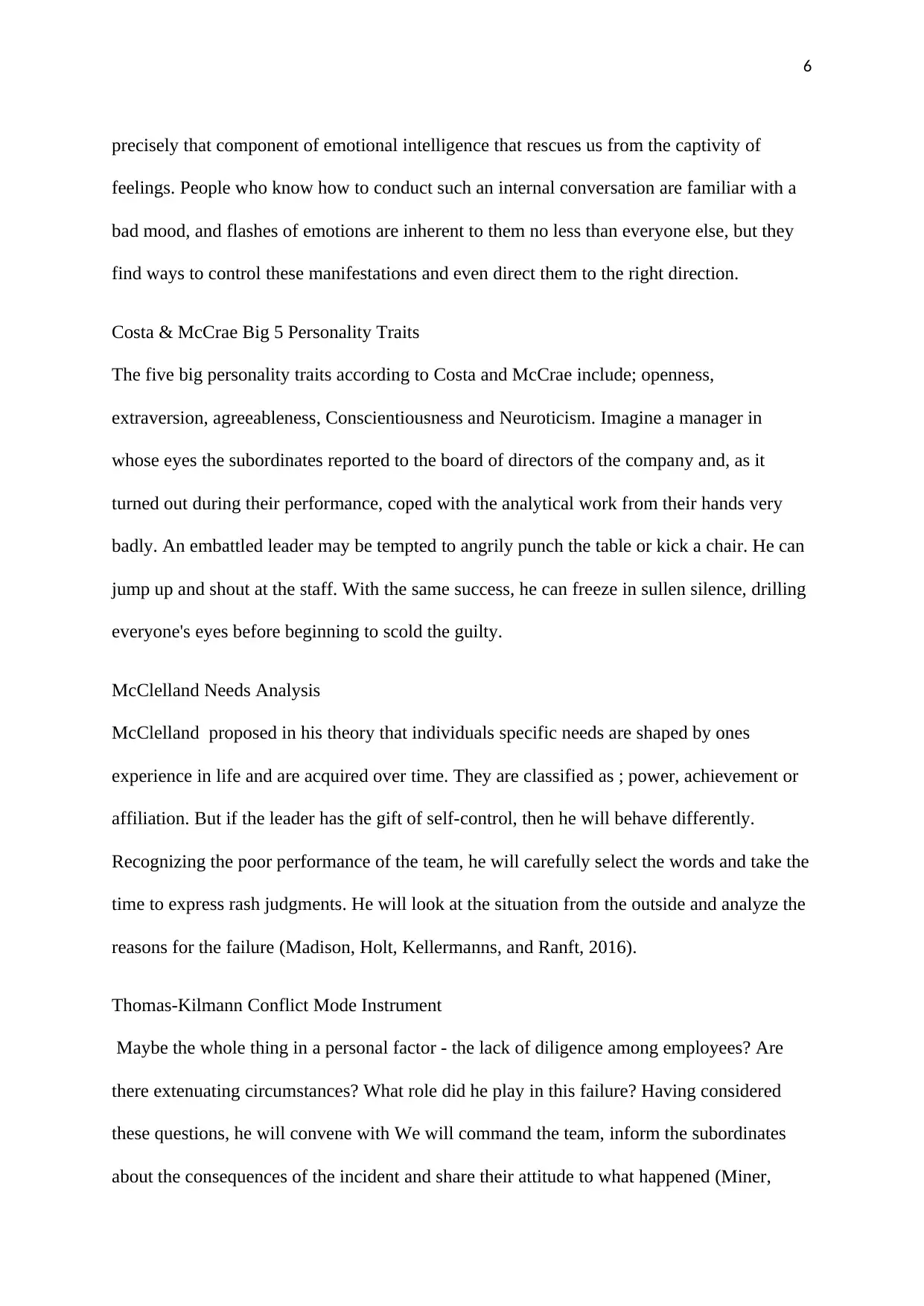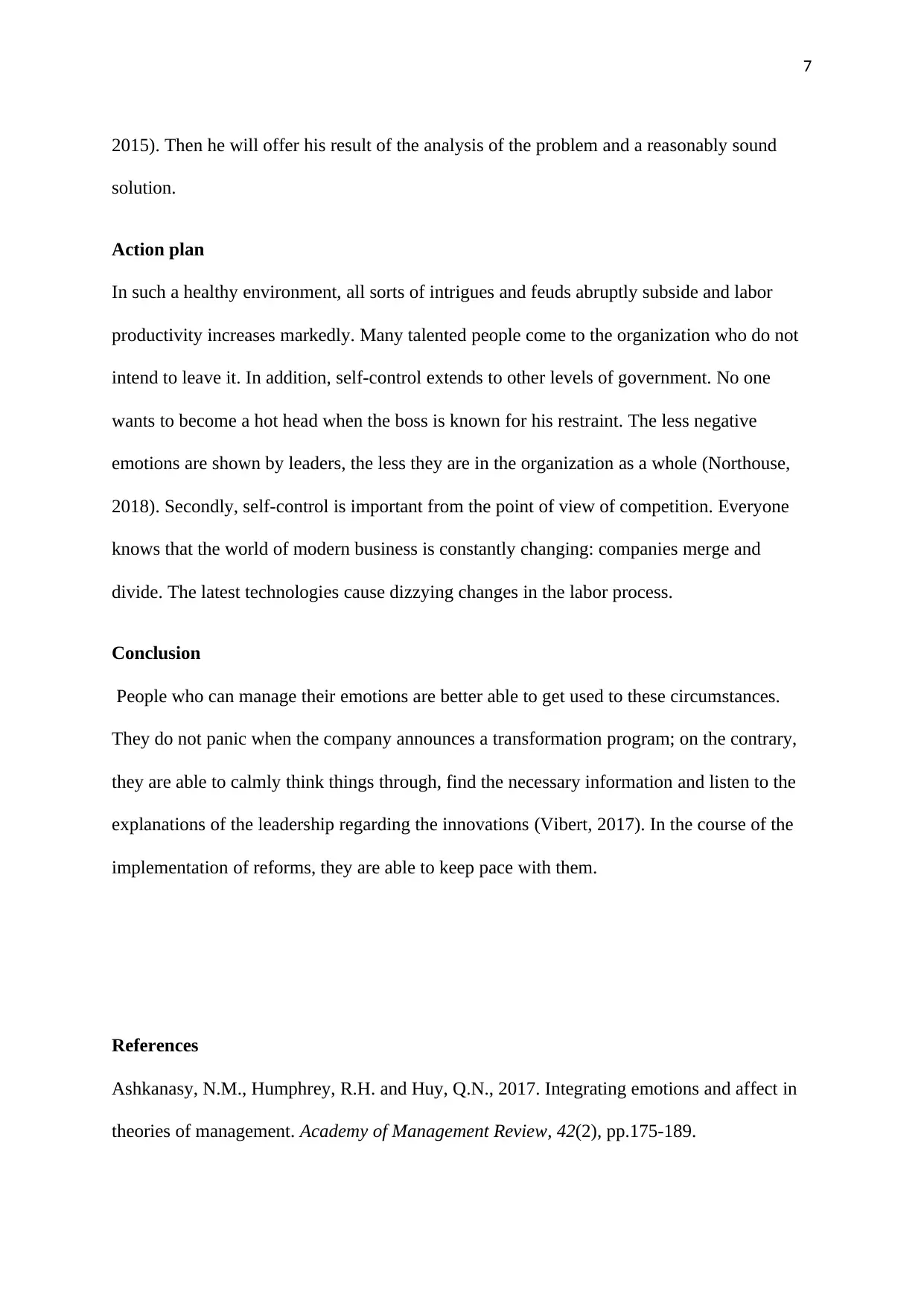Developing Emotional Intelligence in the Workplace
VerifiedAdded on 2022/11/14
|8
|1702
|361
AI Summary
This article discusses the importance of self-awareness and self-control in leadership and management. It explores the concept of emotional intelligence and how it can be developed in the workplace. The article also reviews various personality tests and conflict resolution instruments that can help individuals improve their emotional intelligence.
Contribute Materials
Your contribution can guide someone’s learning journey. Share your
documents today.

1
Name:
Course
Professor’s name
University name
City, State
Date of submission
Name:
Course
Professor’s name
University name
City, State
Date of submission
Secure Best Marks with AI Grader
Need help grading? Try our AI Grader for instant feedback on your assignments.

2
. ;’
Executive Summary
People with a developed self-consciousness are realists: they are not too self-critical, but they
also do not harbor unrealizable hopes. They are not cunning and honest in their relations with
others. A person who has a developed self-awareness perfectly understands what impact his
feelings have on himself and on the people around him and how they affect labor
performance, leadership and management. Thus, we have at our disposal more and more
quantitative data, convincingly testifying to the connection of the company's commercial
success with the emotional intelligence of its leaders. Research, in addition, revealed another
equally important fact: when using the right approach, each person may well develop a high
emotional intelligence.
Table of Contents
. ;’
Executive Summary
People with a developed self-consciousness are realists: they are not too self-critical, but they
also do not harbor unrealizable hopes. They are not cunning and honest in their relations with
others. A person who has a developed self-awareness perfectly understands what impact his
feelings have on himself and on the people around him and how they affect labor
performance, leadership and management. Thus, we have at our disposal more and more
quantitative data, convincingly testifying to the connection of the company's commercial
success with the emotional intelligence of its leaders. Research, in addition, revealed another
equally important fact: when using the right approach, each person may well develop a high
emotional intelligence.
Table of Contents

3
Executive Summary...................................................................................................................2
Introduction................................................................................................................................2
Brief Review of Findings...........................................................................................................2
Critical analysis of the topics.....................................................................................................3
Myer Briggs personality test..................................................................................................3
Costa & McCrae Big 5 Personality Traits..............................................................................3
McClelland Needs Analysis...................................................................................................4
Thomas-Kilmann Conflict Mode Instrument.........................................................................4
Action plan.................................................................................................................................4
Conclusion.................................................................................................................................4
References..................................................................................................................................4
Introduction
Self-awareness
Executive Summary...................................................................................................................2
Introduction................................................................................................................................2
Brief Review of Findings...........................................................................................................2
Critical analysis of the topics.....................................................................................................3
Myer Briggs personality test..................................................................................................3
Costa & McCrae Big 5 Personality Traits..............................................................................3
McClelland Needs Analysis...................................................................................................4
Thomas-Kilmann Conflict Mode Instrument.........................................................................4
Action plan.................................................................................................................................4
Conclusion.................................................................................................................................4
References..................................................................................................................................4
Introduction
Self-awareness

4
If we recall the advice of the Delphic oracle given thousands of years ago: “Know yourself,”
then you will hardly be surprised that it is self-consciousness that is the first component of
emotional intelligence.
Is it possible to learn emotional intelligence?
For the first century, people have been discussing what leadership is, becoming leaders or
being born. The same controversy is going on around emotional intelligence. In order to
actually develop emotional intelligence, organizations must reorient their learning methods to
reflect the characteristics of the limbic which system (Ashkanasy, Humphrey, and Huy,
2017). They need to help their employees get rid of obsolete habits and learn new behaviors.
True, this will not only take much more time than the use of traditional training programs, but
will also require an individual approach to each employee.
Brief Review of Findings
The decisions of people with a developed self-consciousness are consistent with their values,
and therefore, work for them is often a source of energy. Such a reasonable attitude towards
yourself can be seen in a person when applying for a job. Ask a specialist who is applying for
a particular job to describe a case when he allowed himself to give in to his feelings and did
something that he later regretted. Developed self-conscious candidates usually acknowledge
their failures - and often talk about them with a smile. One of the signs of self-awareness is
the ability to laugh at yourself (Hogan, 2017).
On the contrary, people who do not have a developed self-consciousness perceive remarks
about the need to improve as a threat to their well-being or a sign of failure. Consider the
behavior of one such middle manager - an employee who was invited to a strategic meeting
of representatives of the company's top management. Being the youngest at this meeting, she,
If we recall the advice of the Delphic oracle given thousands of years ago: “Know yourself,”
then you will hardly be surprised that it is self-consciousness that is the first component of
emotional intelligence.
Is it possible to learn emotional intelligence?
For the first century, people have been discussing what leadership is, becoming leaders or
being born. The same controversy is going on around emotional intelligence. In order to
actually develop emotional intelligence, organizations must reorient their learning methods to
reflect the characteristics of the limbic which system (Ashkanasy, Humphrey, and Huy,
2017). They need to help their employees get rid of obsolete habits and learn new behaviors.
True, this will not only take much more time than the use of traditional training programs, but
will also require an individual approach to each employee.
Brief Review of Findings
The decisions of people with a developed self-consciousness are consistent with their values,
and therefore, work for them is often a source of energy. Such a reasonable attitude towards
yourself can be seen in a person when applying for a job. Ask a specialist who is applying for
a particular job to describe a case when he allowed himself to give in to his feelings and did
something that he later regretted. Developed self-conscious candidates usually acknowledge
their failures - and often talk about them with a smile. One of the signs of self-awareness is
the ability to laugh at yourself (Hogan, 2017).
On the contrary, people who do not have a developed self-consciousness perceive remarks
about the need to improve as a threat to their well-being or a sign of failure. Consider the
behavior of one such middle manager - an employee who was invited to a strategic meeting
of representatives of the company's top management. Being the youngest at this meeting, she,
Secure Best Marks with AI Grader
Need help grading? Try our AI Grader for instant feedback on your assignments.

5
however, did not sit quietly in the corner, numb from awe and fear (Kim, Ployhart, and
Gibson, 2018). She knew that she possesses art convincingly and clearly expounded her
ideas, and therefore decided to come forward with reasoned suggestions about corporate
strategy. At the same time, thanks to a developed self-consciousness, she did not invade
foreign territory, knowing that her chances there would be small and she would not make the
right impression.
Employees with a developed self-awareness are of great value to an organization, and yet my
research has shown that when selecting people for the role of potential leaders, leading
leaders rarely appreciate this quality as high as it deserves (Lussier, and Achua, 2015). Many
managers mistakenly take the sincerity of feelings for "softness" and deny proper respect to
employees who openly admit their flaws. Such candidates are rejected out of hand as
ostensibly “not tough enough” to control other people.
In fact, everything is just the opposite. First, employees usually treat sincere leaders with
enthusiasm and respect. Secondly, the leaders constantly have to single-handedly make
difficult decisions that require an unbiased assessment of their abilities, both their own and
those of others. Do we have enough managerial skills to buy a competing firm? Will we be
able to market a new product in six months? People who are able to adequately assess
themselves, can not be better able to cope with a similar task in relation to the organization.
Critical analysis of the topics
Myer Briggs personality test
This is a test on the personality type of a person. It has 16 types of personalities where most
organizations conduct the test to assess the personality type of their employees. Our emotions
are controlled by biological impulses. We are not able to get rid of them, but we can well
learn to keep them in check. Self-control, reminiscent of a constant dialogue with oneself, is
however, did not sit quietly in the corner, numb from awe and fear (Kim, Ployhart, and
Gibson, 2018). She knew that she possesses art convincingly and clearly expounded her
ideas, and therefore decided to come forward with reasoned suggestions about corporate
strategy. At the same time, thanks to a developed self-consciousness, she did not invade
foreign territory, knowing that her chances there would be small and she would not make the
right impression.
Employees with a developed self-awareness are of great value to an organization, and yet my
research has shown that when selecting people for the role of potential leaders, leading
leaders rarely appreciate this quality as high as it deserves (Lussier, and Achua, 2015). Many
managers mistakenly take the sincerity of feelings for "softness" and deny proper respect to
employees who openly admit their flaws. Such candidates are rejected out of hand as
ostensibly “not tough enough” to control other people.
In fact, everything is just the opposite. First, employees usually treat sincere leaders with
enthusiasm and respect. Secondly, the leaders constantly have to single-handedly make
difficult decisions that require an unbiased assessment of their abilities, both their own and
those of others. Do we have enough managerial skills to buy a competing firm? Will we be
able to market a new product in six months? People who are able to adequately assess
themselves, can not be better able to cope with a similar task in relation to the organization.
Critical analysis of the topics
Myer Briggs personality test
This is a test on the personality type of a person. It has 16 types of personalities where most
organizations conduct the test to assess the personality type of their employees. Our emotions
are controlled by biological impulses. We are not able to get rid of them, but we can well
learn to keep them in check. Self-control, reminiscent of a constant dialogue with oneself, is

6
precisely that component of emotional intelligence that rescues us from the captivity of
feelings. People who know how to conduct such an internal conversation are familiar with a
bad mood, and flashes of emotions are inherent to them no less than everyone else, but they
find ways to control these manifestations and even direct them to the right direction.
Costa & McCrae Big 5 Personality Traits
The five big personality traits according to Costa and McCrae include; openness,
extraversion, agreeableness, Conscientiousness and Neuroticism. Imagine a manager in
whose eyes the subordinates reported to the board of directors of the company and, as it
turned out during their performance, coped with the analytical work from their hands very
badly. An embattled leader may be tempted to angrily punch the table or kick a chair. He can
jump up and shout at the staff. With the same success, he can freeze in sullen silence, drilling
everyone's eyes before beginning to scold the guilty.
McClelland Needs Analysis
McClelland proposed in his theory that individuals specific needs are shaped by ones
experience in life and are acquired over time. They are classified as ; power, achievement or
affiliation. But if the leader has the gift of self-control, then he will behave differently.
Recognizing the poor performance of the team, he will carefully select the words and take the
time to express rash judgments. He will look at the situation from the outside and analyze the
reasons for the failure (Madison, Holt, Kellermanns, and Ranft, 2016).
Thomas-Kilmann Conflict Mode Instrument
Maybe the whole thing in a personal factor - the lack of diligence among employees? Are
there extenuating circumstances? What role did he play in this failure? Having considered
these questions, he will convene with We will command the team, inform the subordinates
about the consequences of the incident and share their attitude to what happened (Miner,
precisely that component of emotional intelligence that rescues us from the captivity of
feelings. People who know how to conduct such an internal conversation are familiar with a
bad mood, and flashes of emotions are inherent to them no less than everyone else, but they
find ways to control these manifestations and even direct them to the right direction.
Costa & McCrae Big 5 Personality Traits
The five big personality traits according to Costa and McCrae include; openness,
extraversion, agreeableness, Conscientiousness and Neuroticism. Imagine a manager in
whose eyes the subordinates reported to the board of directors of the company and, as it
turned out during their performance, coped with the analytical work from their hands very
badly. An embattled leader may be tempted to angrily punch the table or kick a chair. He can
jump up and shout at the staff. With the same success, he can freeze in sullen silence, drilling
everyone's eyes before beginning to scold the guilty.
McClelland Needs Analysis
McClelland proposed in his theory that individuals specific needs are shaped by ones
experience in life and are acquired over time. They are classified as ; power, achievement or
affiliation. But if the leader has the gift of self-control, then he will behave differently.
Recognizing the poor performance of the team, he will carefully select the words and take the
time to express rash judgments. He will look at the situation from the outside and analyze the
reasons for the failure (Madison, Holt, Kellermanns, and Ranft, 2016).
Thomas-Kilmann Conflict Mode Instrument
Maybe the whole thing in a personal factor - the lack of diligence among employees? Are
there extenuating circumstances? What role did he play in this failure? Having considered
these questions, he will convene with We will command the team, inform the subordinates
about the consequences of the incident and share their attitude to what happened (Miner,

7
2015). Then he will offer his result of the analysis of the problem and a reasonably sound
solution.
Action plan
In such a healthy environment, all sorts of intrigues and feuds abruptly subside and labor
productivity increases markedly. Many talented people come to the organization who do not
intend to leave it. In addition, self-control extends to other levels of government. No one
wants to become a hot head when the boss is known for his restraint. The less negative
emotions are shown by leaders, the less they are in the organization as a whole (Northouse,
2018). Secondly, self-control is important from the point of view of competition. Everyone
knows that the world of modern business is constantly changing: companies merge and
divide. The latest technologies cause dizzying changes in the labor process.
Conclusion
People who can manage their emotions are better able to get used to these circumstances.
They do not panic when the company announces a transformation program; on the contrary,
they are able to calmly think things through, find the necessary information and listen to the
explanations of the leadership regarding the innovations (Vibert, 2017). In the course of the
implementation of reforms, they are able to keep pace with them.
References
Ashkanasy, N.M., Humphrey, R.H. and Huy, Q.N., 2017. Integrating emotions and affect in
theories of management. Academy of Management Review, 42(2), pp.175-189.
2015). Then he will offer his result of the analysis of the problem and a reasonably sound
solution.
Action plan
In such a healthy environment, all sorts of intrigues and feuds abruptly subside and labor
productivity increases markedly. Many talented people come to the organization who do not
intend to leave it. In addition, self-control extends to other levels of government. No one
wants to become a hot head when the boss is known for his restraint. The less negative
emotions are shown by leaders, the less they are in the organization as a whole (Northouse,
2018). Secondly, self-control is important from the point of view of competition. Everyone
knows that the world of modern business is constantly changing: companies merge and
divide. The latest technologies cause dizzying changes in the labor process.
Conclusion
People who can manage their emotions are better able to get used to these circumstances.
They do not panic when the company announces a transformation program; on the contrary,
they are able to calmly think things through, find the necessary information and listen to the
explanations of the leadership regarding the innovations (Vibert, 2017). In the course of the
implementation of reforms, they are able to keep pace with them.
References
Ashkanasy, N.M., Humphrey, R.H. and Huy, Q.N., 2017. Integrating emotions and affect in
theories of management. Academy of Management Review, 42(2), pp.175-189.
Paraphrase This Document
Need a fresh take? Get an instant paraphrase of this document with our AI Paraphraser

8
Hogan, R., 2017. Personality and the fate of organizations. Psychology Press.
Kim, P.H., Ployhart, R.E. and Gibson, C.B., 2018. Editors’ Comments: Is Organizational
Behavior Overtheorized?. Academy of Management Review, 43(4), pp.541-545.
Lussier, R.N. and Achua, C.F., 2015. Leadership: Theory, application, & skill development.
Nelson Education.
Madison, K., Holt, D.T., Kellermanns, F.W. and Ranft, A.L., 2016. Viewing family firm
behavior and governance through the lens of agency and stewardship theories. Family
Business Review, 29(1), pp.65-93.
Miner, J.B., 2015. Organizational behavior 1: Essential theories of motivation and
leadership. Routledge.
Northouse, P.G., 2018. Leadership: Theory and practice. Sage publications.
Vibert, C., 2017. Theories of Macro-Organizational Behavior: A Handbook of Ideas and
Explanations: A Handbook of Ideas and Explanations. Routledge.
Hogan, R., 2017. Personality and the fate of organizations. Psychology Press.
Kim, P.H., Ployhart, R.E. and Gibson, C.B., 2018. Editors’ Comments: Is Organizational
Behavior Overtheorized?. Academy of Management Review, 43(4), pp.541-545.
Lussier, R.N. and Achua, C.F., 2015. Leadership: Theory, application, & skill development.
Nelson Education.
Madison, K., Holt, D.T., Kellermanns, F.W. and Ranft, A.L., 2016. Viewing family firm
behavior and governance through the lens of agency and stewardship theories. Family
Business Review, 29(1), pp.65-93.
Miner, J.B., 2015. Organizational behavior 1: Essential theories of motivation and
leadership. Routledge.
Northouse, P.G., 2018. Leadership: Theory and practice. Sage publications.
Vibert, C., 2017. Theories of Macro-Organizational Behavior: A Handbook of Ideas and
Explanations: A Handbook of Ideas and Explanations. Routledge.
1 out of 8
Related Documents
Your All-in-One AI-Powered Toolkit for Academic Success.
+13062052269
info@desklib.com
Available 24*7 on WhatsApp / Email
![[object Object]](/_next/static/media/star-bottom.7253800d.svg)
Unlock your academic potential
© 2024 | Zucol Services PVT LTD | All rights reserved.





